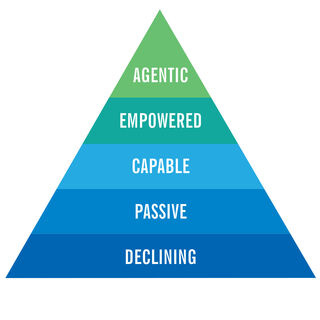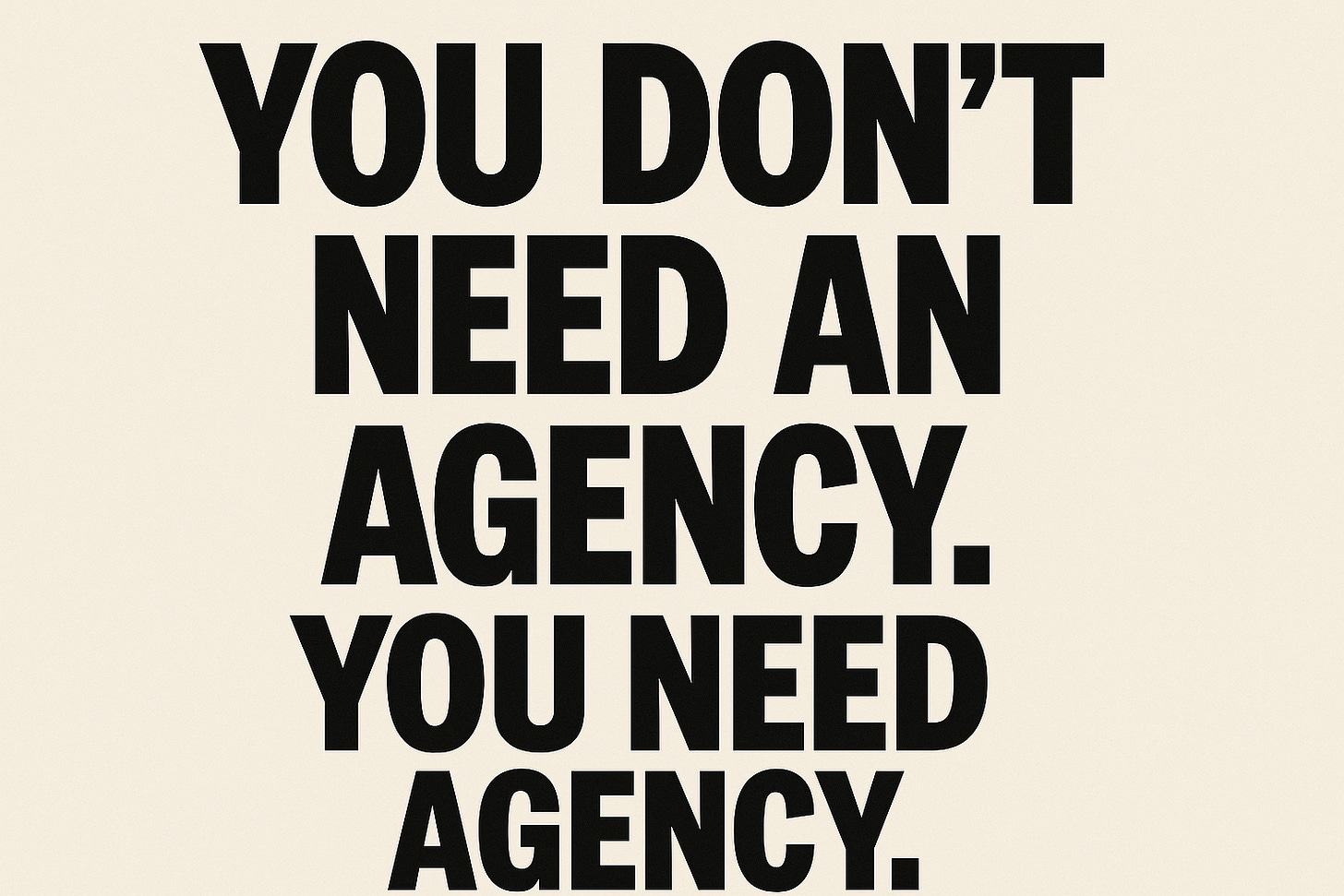We’ve confused a word.
Agency, in the personal sense, is the ability to direct your own outcomes:
To set a vision, make decisions, and put it into motion.
In short: to move with clarity and autonomy.
Agency, in the commercial sense, is a vendor.
You outsource the work. They give you outputs.
Maybe they “get it.” Maybe they just get paid.
Most agencies don’t give you agency.
They give you dependency, with a glossy deck and a markup.
The Pyramid That Clarifies Everything

This isn’t about marketing. It’s about mindset.
Real growth, organizational or individual, only happens as you move up:
Declining: “I can’t keep up.”
Passive: “I’ll wait for direction.”
Capable: “I can do the work.”
Empowered: “I have the tools and support.”
Agentic: “I own the outcome, and I shape the path.”
Hiring an agency can simulate progress.
But it usually keeps you hovering in the middle, capable, maybe empowered.
Agentic? That’s different.
That requires:
Setting your direction
Understanding the why behind your strategy
Managing ambiguity without outsourcing it
Learning and adapting in real time
No agency can do that for you.
Agentic AI Didn’t Kill the Agency Model. It Just Exposed It.
Agentic AI isn’t just a toolset.
It’s revealing that the things agencies used to sell, content, design, strategy decks, even insights, are now accessible to anyone with clarity and a laptop.
You don’t need to hire an agency to:
Write a campaign
Build a website
Analyze customer behavior
Simulate messaging outcomes
Sequence a go-to-market roadmap
But here’s the twist:
The bottleneck isn’t capability.
It’s clarity.
AI can act. But only you can decide what matters.
Only you can define the problem worth solving.
Only you can lead.
The Real Work Now: Build Teams with Agency
The future doesn’t belong to the best outsourcers.
It belongs to those who:
Cultivate internal ownership
Design for adaptive autonomy
Empower teams to act, not wait
Lead with discernment, not delegation
Because what companies need isn’t more agencies, it’s more people with agency.
Delegation Isn’t Dead; But It Needs to Evolve
Delegation isn’t the enemy of leadership at scale.
Blind delegation is.
In the early stages of growth, delegation often means handing off tasks to people you trust, fast-moving generalists who can “figure it out.” That works… until it doesn’t.
At scale, the stakes shift.
Tasks become decisions.
Decisions shape direction.
And if the people you’re delegating to don’t have clarity, competence, and buy-in, you’re not distributing leadership, you’re diluting it.
Delegation only works when the people you hand responsibility to are operating at an agentic level:
They understand the why, not just the what.
They manage their time, energy, and priorities proactively.
They adapt in real-time without waiting for instructions.
They see themselves as responsible for the outcome, not just the activity.
In this context, delegation isn’t abdication, it’s strategic trust.
It becomes a multiplier, not a liability.
TL;DR: Rent Less. Rethink More.
You don’t need more hands. You need more authors.
You don’t need more outputs. You need deeper insight.
You don’t need another agency. You need to reclaim your own.
Agency is not a vendor. It’s a muscle. Build it.
Disclosure & Source Acknowledgment
This article builds upon the psychological framework of personal agency as explored in “Agency Is the Highest Level of Personal Competence” by Thomas S. Bateman, published in Psychology Today (March 2022). The Competence Mindset Hierarchy referenced in this piece — Declining, Passive, Capable, Empowered, and Agentic — is adapted from that article and serves as a foundation for understanding how real growth requires an evolution in how we lead, delegate, and act.
The accompanying visual hierarchy is credited to Dick Close, illustrator of the original diagram.
While this article reframes Bateman’s framework through the lens of leadership, delegation, and organizational scale, all psychological underpinnings remain with the original author. No formal affiliation is claimed.
This content is shared to support reflection and dialogue around the difference between outsourcing responsibility and cultivating deep, distributed agency — the kind that scales with clarity, not just complexity.





